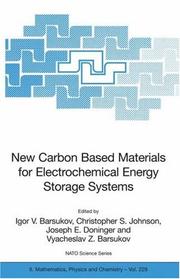| Listing 1 - 2 of 2 |
Sort by
|
Book
ISBN: 9780387764238 9780387764245 0387764232 9786611875770 1281875775 0387764240 Year: 2009 Publisher: New York ; London : Springer,
Abstract | Keywords | Export | Availability | Bookmark
 Loading...
Loading...Choose an application
- Reference Manager
- EndNote
- RefWorks (Direct export to RefWorks)
Storage and conversion are critical components of important energy-related technologies. Advanced Batteries: Materials Science Aspects employs materials science concepts and tools to describe the critical features that control the behavior of advanced electrochemical storage systems. This volume focuses on the basic phenomena that determine the properties of the components, i.e. electrodes and electrolytes, of advanced systems, as well as experimental methods used to study their critical parameters. This unique materials science approach utilizes concepts and methodologies different from those typical in electrochemical texts, offering a fresh, fundamental and tutorial perspective of advanced battery systems. Graduate students, scientists and engineers interested in electrochemical energy storage and conversion will find Advanced Batteries: Materials Science Aspects a valuable reference.
transistoren --- Electricity --- Electronics and optics of solids --- stroomverdeling --- Macromolecules --- stroomvoorziening --- halfgeleiders --- elektrochemie --- polymeren --- spectroscopie --- Electrochemistry --- batterijen --- fysica --- Electric batteries --- Electrodes --- Electrolytes --- Materials --- Electric batteries. --- Electric power supplies to apparatus. --- Power supplies to apparatus, Electric --- Electric power --- Batteries, Electric --- Batteries (Electricity) --- Cell, Voltaic --- Electrical batteries --- Electrochemical cells --- Galvanic batteries --- Voltaic cell --- Electric power supplies to apparatus --- Thermopiles --- Electric batteries - Materials

ISBN: 9781402048128 1402048106 9781402048104 1402048114 9786610625321 1280625325 1402048122 Year: 2006 Volume: 229 Publisher: Dordrecht Springer
Abstract | Keywords | Export | Availability | Bookmark
 Loading...
Loading...Choose an application
- Reference Manager
- EndNote
- RefWorks (Direct export to RefWorks)
Carbonaceous materials play a fundamental role in electrochemical energy storage systems. Carbon in the structural form of graphite is widely used as the active material in lithium-ion batteries; it is abundant, and environmentally friendly. Carbon is also used to conduct and distribute charge effectively throughout composite electrodes of supercapacitors, batteries and fuel cells. The electronic conductive pathways are critical to delivering and extracting current out of the device. However, many challenges and the understanding of the role of carbon and its stability and efficiency in charge storage applications still exists. This NATO-ARW volume contains a diverse collection of papers addressing the role of carbon in some key electrochemical systems, both conventional and emerging. These papers discuss the latest issues associated with development, synthesis, characterization and use of new advanced carbonaceous materials for electrochemical energy storage. Such systems include: metal-air primary and rechargeable batteries, fuel cells, supercapacitors, cathodes and anodes of lithium-ion and lithium polymer rechargeable batteries, as well as nanocarbon materials of the future.
halfgeleiders --- Electronics and optics of solids --- engineering --- brandstofcellen --- nanotechniek --- Electrochemistry --- fysicochemie --- Electrical engineering --- elektrochemie --- transistoren --- elektrische energie --- fysica --- Solid state physics --- Ceramic materials --- Electronics --- Batteries (Ordnance) --- Fuel cells --- Matériaux céramiques --- Electroniques matériaux --- Batteries (Science militaire) --- Piles à combustible --- Congresses --- Materials --- Congrès --- EPUB-LIV-FT LIVCHIMI SPRINGER-B --- Materials. --- Chemistry. --- Optical materials. --- Optics, Lasers, Photonics, Optical Devices. --- Energy Storage. --- Materials Science, general. --- Electrochemistry. --- Energy Systems. --- Optical and Electronic Materials. --- Optics --- Physical sciences --- Engineering --- Engineering materials --- Industrial materials --- Engineering design --- Manufacturing processes --- Congresses. --- Lasers. --- Photonics. --- Energy storage. --- Materials science. --- Energy systems. --- Electronic materials. --- Electronic materials --- Chemistry, Physical and theoretical --- Material science --- Storage of energy --- Force and energy --- Power (Mechanics) --- Flywheels --- Pulsed power systems --- New optics --- Light amplification by stimulated emission of radiation --- Masers, Optical --- Optical masers --- Light amplifiers --- Light sources --- Optoelectronic devices --- Nonlinear optics --- Optical parametric oscillators
| Listing 1 - 2 of 2 |
Sort by
|

 Search
Search Feedback
Feedback About UniCat
About UniCat  Help
Help News
News